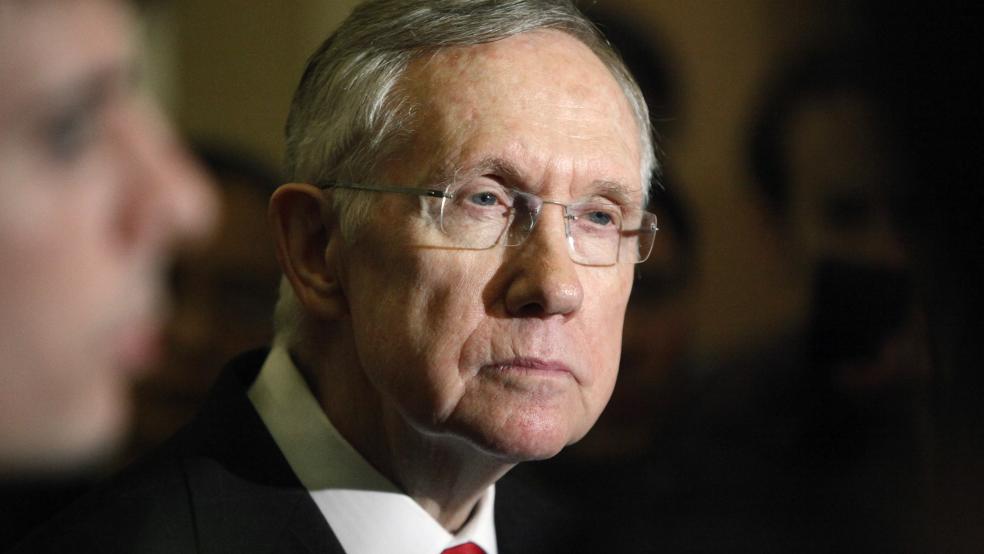Senator Harry Reid, whose one-man crusade against the billionaire industrialist Koch brothers comes up practically every time he takes to the Senate floor, took things to the next level Thursday morning, announcing that he will throw his support behind an effort to amend the Constitution in a way that would render the Supreme Court’s controversial Citizens United ruling moot by legalizing restrictions on campaign finance spending.
Aside from the fact that they support Republicans, Reid’s problem with Charles and David Koch is twofold. First, their ability to throw hundreds of millions of dollars into campaign efforts gives them an outsized voice in U.S. politics. Second, the two brothers have, very effectively, developed a byzantine system of organizations capable of funneling hundreds of millions of dollars in campaign money to candidates and groups that they support, largely without disclosing their involvement.
Related: Reid Ties GOP Filibuster of Minimum Wage Bill to Koch Brothers
Reid conceded that neither of the major parties have clean hands when it comes to accepting campaign donations from the rich.
“No one should be able to pump unlimited funds into political campaigns, whether they are Democrat, Republican or Independent,” Reid said. “As one political observer noted, we currently have a campaign finance system in place which compels each party to pick which billionaires they like best.”
Reid announced that he was throwing his support behind a Constitutional amendment proposed by Sens. Tom Udall (D-NM) and Michael Bennet (D-CO) that would give the federal government the authority to regulate campaign spending in federal races, and allow the individual states to regulate spending within their borders.
The amendment reads, in part, “To advance the fundamental principle of political equality for all, and to protect the integrity of the legislative and electoral processes, Congress shall have power to regulate the raising and spending of money and in-kind equivalents with respect to Federal elections, including through setting limits on (1) the amount of contributions to candidates for nomination for election to, or for election to, Federal office; (2) the amount of funds that may be spent by, in support of, or in opposition to such candidates.”
Related: Sheldon Adelson Isn’t in This for the Money, Says Harry Reid
It goes on to give similar authority to the states, and notes that the amendment should not in any way be construed as limiting the freedom of the press.
If it were to succeed, the amendment would render moot a pair of controversial Supreme Court rulings, most notably the Citizens United decision, which in 2011 overturned decades of precedent by essentially equating money with speech and declaring that any limits on independent spending by companies, associations, or unions violated their First Amendment right to free speech. Also affected would be the decision in the McCutcheon case, from earlier this year, which struck down limits on total contributions by an individual donor.
Amending the Constitution is “no small thing,” Reid said, but justified the move by arguing that “the flood of special interest money in our American democracy is one of the glaring threats our system of government has ever faced. Let's keep our elections from becoming speculative ventures for the wealthy, put a stop to the hostile takeover of our Democratic system by a couple of billionaire oil barons. It's time we revive our constituents' faith in our electoral system and let them know their voices are being heard.”
Related: Election-Year Shift from Reid on Keystone Pipeline
Whether it will succeed is another question. Constitutional amendments require a two-thirds majority in the Senate and the House, and must be ratified by three-quarters of the legislatures of the various states. Even the first step is likely beyond Reid’s reach, but he has promised repeated votes on the issue in the Senate, if only to draw a distinction between the Democrats’ willingness to make the move and Republican reluctance.
Reid’s opposite number in the Senate, Republican Leader Mitch McConnell of Kentucky, took the floor after Reid made his remarks. McConnell, who has made it clear that he agrees with the Supreme Court’s decisions in both Citizens United and McCutcheon, did not address Reid’s proposal, but spoke about the scandalous treatment of sick veterans by the Veterans Administration, and discussed a resolution celebrating the history of Kentucky Bourbon Whiskey.
Later in the day, Sen. McConnell responded to Reid's support of the amendment: “Proposing to take away this fundamental right from the American people and vest it in the federal government instead is the ultimate act of radicalism, and it should concern all Americans who care about their right to speak their minds and to participate freely in the political process,” he said. “Washington Democrats have shown again and again how determined they are to shut down the voices of anyone who disagrees with them… But this latest proposal goes beyond everything they’ve attempted previously. No politician from either party is above the Constitution, and this crass attempt by Democrats to shut down any opposition to their plans should be rejected swiftly and decisively by everyone in this country who prizes the free speech rights guaranteed by the First Amendment.”
This article was updated at 4:20 p.m. on Thursday, May 15, 2014.
Top Reads from The Fiscal Times:





